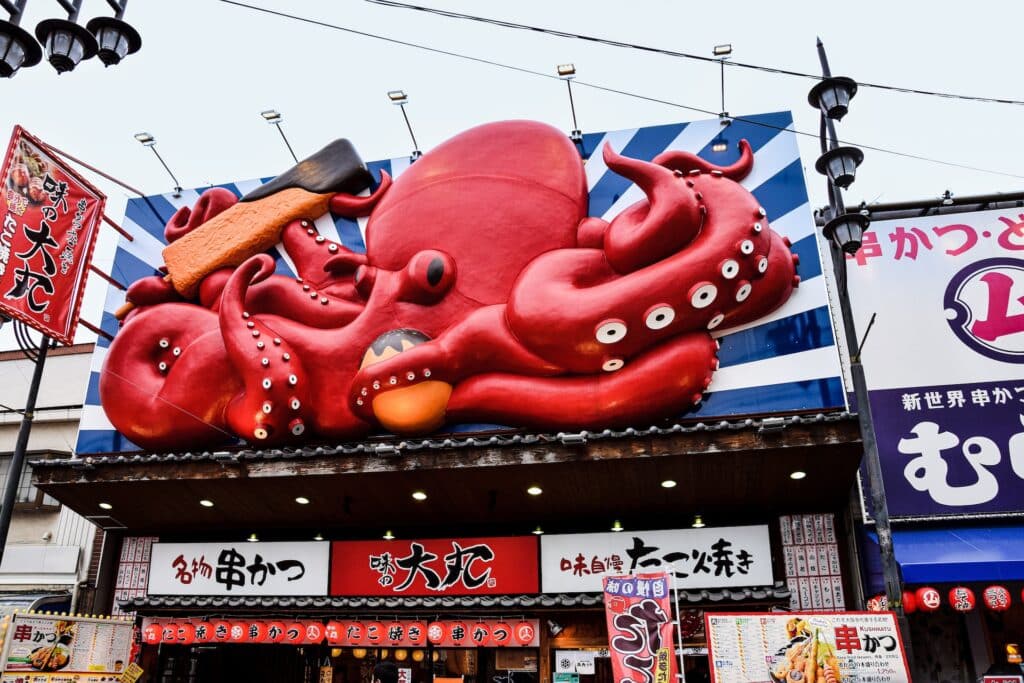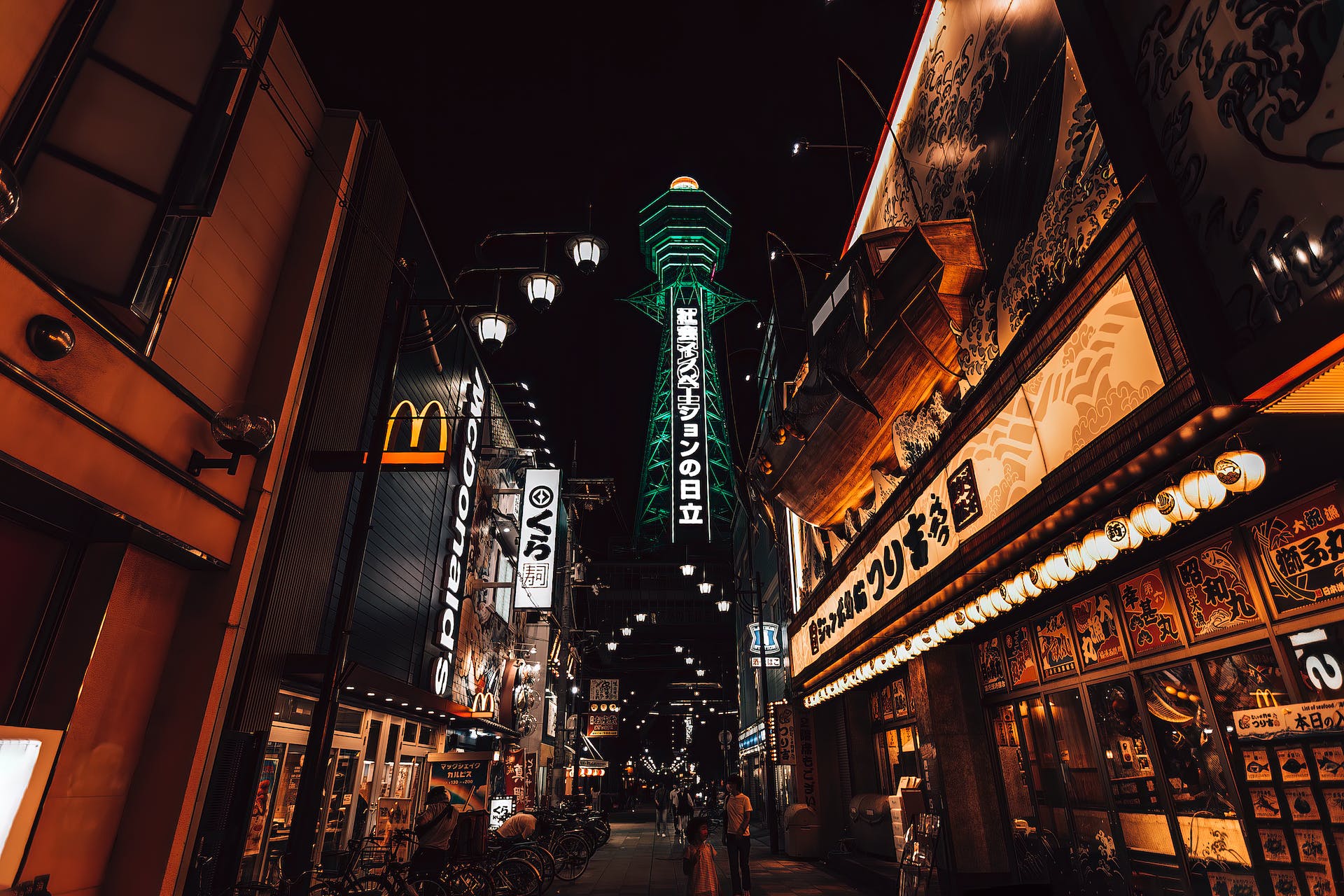
Osaka-ben: 12 Ways to Rock This Badass Japanese Dialect
The Osaka dialect or Osaka-ben (大阪弁 / おおさかべん) is one major variation of the more expansive Kansai dialect (関西弁 / かんさいべん), which is spoken in slightly different ways in the Kansai region’s major prefectures of Kyoto, Kobe and Osaka.
関西弁 and 大阪弁 aren’t the standard Japanese you’ll find in your textbooks, but knowing the quirks of the Osaka dialect can expose you to a different side of the language.
If you’ve got a good grasp of Japanese, a love of food and an iron will, it’s time to graduate from intermediate Japanese to something else entirely.
Let’s jump right in!
Contents
- 1. ええで (No problem / Okay / Yes)
- 2. せやなぁ (Is that so? / Isn’t it? / Let’s see)
- 3. あかんわ!(That’s bad!)
- 4. ちゃうねん!(It’s not like that! / It’s different!)
- 5. せやけど...(That’s true, but …)
- 6. ほんで...(Then … / So …)
- 7. ほななぁ!(See ya!)
- 8. まいど!(Hi! / Hello! / Welcome! / Thanks for your business!)
- 9. ほんまに?(Really?)
- 10. しんどいなぁ...(I’m exhausted / I’m beat)
- 11. あほやなぁ...(What an idiot / So stupid)
- 12. なんでやねん!(What the heck!)
- Why You Should Rock Some Osaka-ben
- Kansai-ben in the Media
- Other Places to Learn Osaka-ben
- And One More Thing...
Download: This blog post is available as a convenient and portable PDF that you can take anywhere. Click here to get a copy. (Download)
1. ええで (No problem / Okay / Yes)
Standard Japanese equivalent: いいよ
One characteristic of 大阪弁 is the use of ええ to replace いい, which means “good.” As you probably know, いい is used in a number of common expressions. In this case, it’s used to imply that you’re giving consent.
The second 大阪弁 characteristic here is the use of で instead of よ. The pronunciation starts high, and then で generally flattens out in a lower intonation.
A: あっ、えんぴつ忘れてもーた!(あっ、えんぴつ わすれてもーた!) — Ah! I forgot my pencil!
B: 大丈夫やで!これ使ってもええで!(だいじょうぶやで!これ つかってもええで!) — No problem! You can use this one!
2. せやなぁ (Is that so? / Isn’t it? / Let’s see)
Standard Japanese equivalent: そうだねぇ
Another suffix swap-out in Osaka-ben is the use of や instead of だ, which is the casual version of です. As native Osakans (大阪人 / おおさかじん) are fond of softening their consonants, the softer や often takes precedent. The second change here is the な replacing ね.
A: 明日雨降るんやってやー!どないしよう? (あした あめふるんやってやー!どないしよう?) — It says it’s going to rain tomorrow! What should we do?
B: せやなぁ、デート明後日にしようか? (せやなぁ、でーと あさってに しようか?) — You’re right, should we have our date the day after?
3. あかんわ!(That’s bad!)
Standard Japanese equivalent: いけないよ!/ だめ
This is one of the most fun Osakan phrases to learn. It’s often used to indicate that something is bad or should be avoided.
A: あいつの名前なんやったっけ?(あいつの なまえ なんやったっけ?) — What’s that guy’s name again?
B: あいつって!?山本社長やんか!あかんわ!!(あいつって!?やまもとしゃちょう やんか!あかんわ !!) — “That guy”!? That’s President Yamamoto! That’s terrible!*
You might already know that あいつ is a pretty rude word to use when referring to someone. Make sure you only use it with very close friends!
4. ちゃうねん!(It’s not like that! / It’s different!)
Standard Japanese equivalent: 違うんだ!
You’ll hear this a lot when roaming the streets of Osaka. Notably, the suffix ねん is used in declarative statements for emphasis in the same way んだ does in standard Japanese.
Usually used to express 違う (ちがう) or “wrong,” it can also be used to replace じゃない?like in いいんじゃない?or “It’s good/fine isn’t it?”
In 大阪弁, you might say:
A: このワンピースはどう?(この わんぴーすは どう?) — What d’you think of this dress?
B: うん、ええんちゃう? — Yeah, good isn’t it?
Another example:
A: 海まで二時間かかるって、めちゃめちゃ遠いやん!(うみまで にじかんかかるって、めちゃめちゃ とおいやん!) — It’s going to take two hours to get to the beach. That’s crazy far!
B: いやっ、ちゃうねん!高速乗ったら一時間しかかからへん!(いやっ、ちゃうねん!こうそく のったら いちじかんしか かからへん!) — Nah, no way! If we take the highway, it will take only an hour!
5. せやけど...(That’s true, but …)
Standard Japanese equivalent: そうだけど...
Here, you’ll see another exchange of だ and や. Use this conjunction to concede one point and counter with another.
A: 落ちたらもう一度受けることもできるでしょう?(おちたら もういちど うけることもできるでしょう?) — If you fail, you can always take it again, right?
B: せやけど、今回絶対に合格したい!(せやけど、 こんかいぜったいに ごうかくしたい!) — That’s true, but this time I really wanna pass!
6. ほんで...(Then … / So …)
Standard Japanese equivalent: そして...
Here’s another classic example of softening the harder consonants, replacing the そ with a ほ.
A: どないしよう?!財布忘れてもーた!(どないしよう?!さいふ わすれてもーた!) — What am I gonna do?! I forgot my wallet!
B: ほんま?ほんなら俺おごるわな!ほんで、財布取りに行こうか?(ほんま?ほんなら おれおごるわな!ほんで、さいふ とりに いこうか?) — Really? If that’s the case, I’ll pay for you. Then, should we pick up your wallet?
7. ほななぁ!(See ya!)
Standard Japanese equivalent: じゃあね!
You’ve surely encountered じゃあ in your studies, which often means “well then” or “ok,” but you may not have heard of ほな. You’ll definitely know you’re in Osaka when someone bids you “good night” with this:
A: そろそろ帰らんと。ほななぁ。(そろそろかえらんと。ほななぁ。) — I’ve gotta go. See ya!
B: バイバイ (ばいばい) — Bye-bye!*
*This is a cute little loan word, but comes off as less childish in Japanese than in English.
8. まいど!(Hi! / Hello! / Welcome! / Thanks for your business!)
Standard Japanese equivalent: どうも
This is one of those words you’ll hear from local clerks the moment you step foot in their store.
You’ll often hear someone answer a phone call from a friend with:
もしもし...あっ...まいどまいど!(“Hello?… Oh… Hey there!”)
9. ほんまに?(Really?)
Standard Japanese equivalent: 本当に? (ほんとうに?)
Here, you can leave out the に for a shorter, more casual response.
A: このバンドが大阪に来るらしいで!(このばんどが おおさかに くるらしいで!) — Seems like this band is coming to Osaka!
B: ほんま?一緒に行こうか?(ほんま?いっしょに いこうか?) — Really? Wanna go together?
10. しんどいなぁ...(I’m exhausted / I’m beat)
Standard Japanese equivalent: 疲れた (つかれた)...
Climbing the stairs from the subway after a very long day at work, people in Osaka might lament:
A: しんどいなぁ...死にそう!(しんどいなぁ...しにそう!) — I’m beat… I think I’m gonna die.
B: 頑張れ。あとちょっと!(がんばれ。あとちょっと!) — Come on, almost there!
11. あほやなぁ...(What an idiot / So stupid)
Standard Japanese equivalent: バカだね (ばかだね)...
If you want to call someone dumb, you might want to be careful when using the standard ばか in Osaka.
It’s said that people in this area take that form of the word a little more seriously than their Kantō (関東 / かんとう) counterparts. As you probably want to keep your friends, you should opt for the softer, more loving term of endearment: あほ.
A: あっ...また財布忘れてもーた...(あっ...また さいふ わすれてもーた...) — Ah… Forgot my wallet again…
B: (笑) あほやなぁ...([わら] あほやなぁ...) — (laughs) Dummy…
12. なんでやねん!(What the heck!)
Standard Japanese equivalent: (none)
A classic if there ever was one! Probably one of the most famous expressions of 大阪弁 around Japan, this phrase literally means “why is it so?”
But don’t worry, the real meaning is way more awesome.
In 漫才 (まんざい) comedy, there’s always a ボケ(ぼけ) or “fool” character and a second character who more or less reprimands the fool in a hilarious way called the ツッコミ (つっこみ).
When a friend does or says something weird, you respond with this phrase—along with a laugh!
A: なんでか分からへんけど、俺、風邪全然引かへんわー。 (なんでか わからへんけど、おれ、かぜ ぜんぜん ひかへんわー。) — Don’t know why, but I never catch colds.
B: アホは風邪引かないでしょう。 (あほは かぜひかないでしょう。) — I guess idiots don’t catch colds!*
A: なんでやねん!ひどい! — What the heck, that’s harsh!
*Though it might sound a little mean, this is a common urban legend in Japan.
Why You Should Rock Some Osaka-ben
Get To Know the Anti-Tokyo

The moment they start talking, you’ll notice differences in intonation, more relaxed consonants and completely different (and, I daresay, badass) words floating your way.
For example, someone might sigh and remark to a buddy after a rough Saturday night:
今日飲まへんわ (きょう のまへんわ)... — Nah, can’t drink today.
What’s that word, you say?
It’s one of the most commonly heard differences between standard Japanese and the Osaka dialect. You’ll see へん stuck on where there’d usually be a ない in the Kantō region. And that’s just the tip of the iceberg.
Osaka, the third most populous city in Japan, boasts a culture all its own. While Tokyo folks often refer to Osaka people as a bit aggressive because of the slightly gruff flavor of 大阪弁, native 大阪人 quite openly tout their city as the “anti-Tokyo.”
Historically a major merchant hub, locals and visitors alike often remember Osaka for the food, comedy and bartering!
Revel in Baseball Rivalries

One of the fiercest sports rivalries in Japan is the rivalry between Osaka’s Hanshin Tigers (阪神タイガース / はんしんたいがーす) and Tokyo’s Yomiuri Giants (読売ジャイアンツ / よみうりじゃいあんつ). Walk around Osaka station on a game day, and you’ll see swarms of the black, yellow and white-striped uniforms of bonafide Tigers fans.
If you’re tempted to follow them, make sure they know you’re on their team by tossing some friendly 大阪弁 in their direction. (No offense to any Giants fans in Osaka!)
Wander Through “Japan’s Kitchen”

Here you’ll find the reasons that Osaka gained the nickname of “the Nation’s Kitchen” or 天下の台所 (てんかの だいどころ). A few of those delicious, often fried reasons include お好み焼き (おこのみやき) — savory pancake with various ingredients, たこ焼き (たこやき) — fried octopus balls and 串カツ (くしかつ) — pork cutlets on skewers.
As you’re scarfing down this local fare, you’ll begin to understand the underlying meaning of what Japanese people call 食い倒れ (くいだおれ). This literally means “eat ’til you drop,” but that isn’t exactly the way 大阪人 think of it.
This phrase is often described by the locals as a way of life rather than a literal translation of the word.
Essentially, it’s just a deep love of food!
Kansai-ben in the Media
So, you’ve got a handful of awesome ways to jazz up your Japanese the Osakan way. Now where are you going to get your hands on the listening practice you now crave?
The good news: like diamonds in the rough, 大阪弁 is hidden among your favorite anime and dramas, just waiting to be found! Check out a few you may have heard of.
Characters
Hattori Heiji (服部 平次 / はっとりへいじ) in “Detective Conan” (名探偵コナン / めいたんていこなん)
This cheeky guy is a detective in this ridiculously long-running series that first aired in 1996. He shows up intermittently from episode 48 onward, if you’re looking to listen up right now.
In fact, Horikawa Ryō (堀川 りょう/ ほりかわりょう) , the talented actor who voices him, is a full-blown 大阪人!
Hino Hinata (日野 日向 / ひのひなた) in “Mirai Nikki” (未来日記 / みらいにっき)
Starting in episode 8 of this high school romance/psychological thriller, we see a little bit of authentic Osaka love with the voice of Matsuoka Yuki (松岡 由貴 / まつおかゆき), who is also a full-blown 大阪人. I have to warn you, though: “Mirai Nikki” is quite a dark show!
Dramas and Movies
“Grave of the Fireflies” (火垂るの墓 / ほたるのはか)
There’s a reason this Studio Ghibli film, which takes place during World War 2, is often listed as one of the most heartwrenching movies of all time. You’ll feel for the two young protagonists, who must try to live through hard times and the trauma of losing the people they loved to the war.
Most importantly, the film takes place in Osaka, so expect to hear a heavy sprinkling of 大阪弁 all throughout. Even when you’re sniffling into your tissues and drying your eyes, the distinctively warm yet strong dialect is within hearing range.
“Hanzawa Naoki” (半沢直樹 / はんざわなおき)
On a lighter note, this one is an incredibly popular drama about a banker who works in Osaka for part of the show.
大阪人 don’t often show up in major dramas, so the people of Osaka liked that they had some representation in the medium. However, the fact that the 大阪弁 was uttered by Tokyo-born actors can give you a bit of a laugh!
Anime and Manga
Watching this anime will be the most fun you’ll have while getting acquainted with 大阪弁!
An Osaka love story between a very tall girl and a very short boy, you’ll get a feel for the 漫才 comedy style through their very quick-witted dialogue.
Better yet, a lot of the voice actors are 大阪人! For example, the main guy is voiced by Nagata Akira (永田彬 / ながたあきら), who was born and bred in Osaka.
“Jarinko Chie”(じゃりン子チエ / じゃりんこちえ)
This hilarious manga-turned-anime about a tough-talking little girl running her father’s restaurant will have you throwing around あかん like it’s nobody’s business. Speaking of “business,” if you believe the main character Chie, it’s probably not even yours!
If the fact that it contains a hefty amount of 大阪弁 isn’t enough to convince you to give it a shot, it’s also directed by Takahata Isao (高畑勲 / たかはたいさお), who’s also known for his work on Studio Ghibli films—and, incidentally, also directed “Grave of the Fireflies.”
Other Places to Learn Osaka-ben
Once you’ve owned all these words and phrases, you’ll want to be so good that you’ll be counted among the ranks of 大阪人 themselves. Check out these resources for further study:
- Chow Chow Channel: This friendly guy will get you acquainted with verb conjugations and the like.
- FluentU Japanese: This platform contains clips straight from Osaka, so you can hear the dialect and learn specific words and phrases in context.
FluentU takes authentic videos—like music videos, movie trailers, news and inspiring talks—and turns them into personalized language learning lessons.
You can try FluentU for free for 2 weeks. Check out the website or download the iOS app or Android app.
P.S. Click here to take advantage of our current sale! (Expires at the end of this month.)

Now jump on that train, my ambitious comedians, and don’t stop until the announcer tells you you’ve reached 大阪駅 (おおさかえき) — Osaka station.
Grab yourself some たこ焼き, and I’ll meet you there!
ほな、また!
Download: This blog post is available as a convenient and portable PDF that you can take anywhere. Click here to get a copy. (Download)
And One More Thing...
If you love learning Japanese with authentic materials, then I should also tell you more about FluentU.
FluentU naturally and gradually eases you into learning Japanese language and culture. You'll learn real Japanese as it's spoken in real life.
FluentU has a broad range of contemporary videos as you'll see below:

FluentU makes these native Japanese videos approachable through interactive transcripts. Tap on any word to look it up instantly.

All definitions have multiple examples, and they're written for Japanese learners like you. Tap to add words you'd like to review to a vocab list.

And FluentU has a learn mode which turns every video into a language learning lesson. You can always swipe left or right to see more examples.

The best part? FluentU keeps track of your vocabulary, and gives you extra practice with difficult words. It'll even remind you when it’s time to review what you’ve learned. You'll have a 100% personalized experience.
Start using the FluentU website on your computer or tablet or, better yet, download the FluentU app from the iTunes or Google Play store. Click here to take advantage of our current sale! (Expires at the end of this month.)





![Animation - Jarinko Chie Theatrical Feature (2DVDS) [Japan DVD] VWDZ-8228 Animation - Jarinko Chie Theatrical Feature (2DVDS) [Japan DVD] VWDZ-8228](https://m.media-amazon.com/images/I/617ikiNFGjL._SL500_.jpg)


